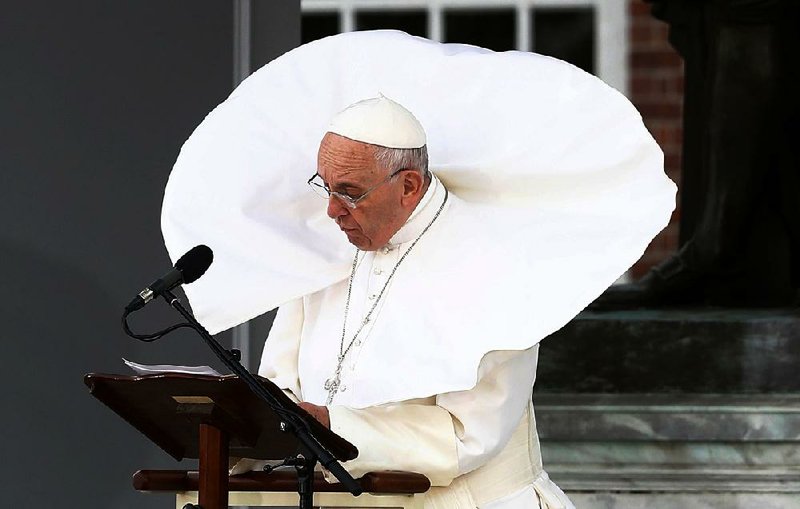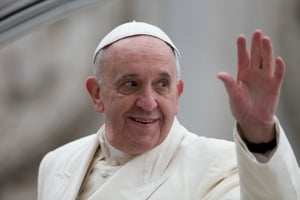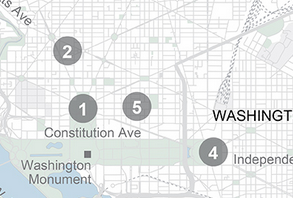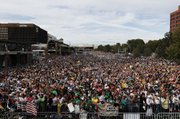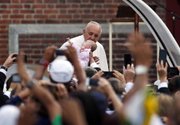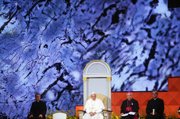PHILADELPHIA -- Standing near the building where the Declaration of Independence and Constitution were signed, Pope Francis extolled America's founding ideals of liberty and equality Saturday while warning that religious freedom is under threat around the globe.
The pontiff arrived in the City of Brotherly Love on the final leg of his six-day U.S. trip, and in a moment rich with historical symbolism, he spoke outside Independence Hall and used the lectern from which Abraham Lincoln delivered the Gettysburg Address.
"Those ringing words continue to inspire us today," the pope said of the Declaration of Independence, "even as they have inspired peoples throughout the world to fight for the freedom to live in accordance with their dignity."
Addressing a crowd of tens of thousands with the red-brick colonial building as a backdrop, Francis cited the abolition of slavery, the growth of the labor movement and the fight for racial equality as proof that "when a country is determined to remain true to its founding principles, based on respect for human dignity, it is strengthened and renewed."
The pope, known for his simple tastes and devotion to the poor and downtrodden, arrived to the strains of Aaron Copland's "Fanfare for the Common Man" and extended a warm welcome to Hispanics and immigrants.
But he said he wanted to talk mostly about religious freedom -- a rallying cry for U.S. bishops who have waged high-profile disputes against gay marriage, abortion and insurer-provided birth control.
Francis didn't directly mention any of those topics in his speech, putting religious liberty instead in a historical and global context.
"In a world where various forms of modern tyranny seek to suppress religious freedom, or try to reduce it to a subculture without right to a voice in the public square, or to use religion as a pretext for hatred and brutality," he said, "it is imperative that the followers of various religions join their voices in calling for peace, tolerance and respect for the dignity and rights of others."
Francis went to Philadelphia to close out a Catholic festival for families. He found a city with blocked-off streets and checkpoints manned by police, National Guardsmen and border agents.
There had been fears that visitors would be scared away by all the security, and, in fact, train ridership was lower than expected, some streets were quiet, and a vendor of pope sunglasses cut his price from $15 to $10 for lack of business.
It remains to be seen whether the expected 1 million people will turn out for Francis' final Mass in the U.S., an outdoor event today on the Benjamin Franklin Parkway.
Earlier Saturday, the pontiff arrived from New York at the Philadelphia airport, where a Catholic high school band played the theme song from the Philadelphia-set movie Rocky. Among those greeting him was Richard Bowes, a former Philadelphia police officer wounded in the line of duty. Francis also kissed the forehead of a boy severely disabled with cerebral palsy.
"I can't believe it," said Johanna Keating, the grandmother of 10-year-old Michael Keating. "God planned it this way."
Mare Amador was one of dozens who traveled all night on a bus from Miami. Amador, who turned 44 on Friday, said she saw Pope John Paul II in her native Peru when she was 12.
Francis celebrated a Mass for about 1,600 people at the downtown Cathedral Basilica of Saints Peter and Paul, saying in his homily that the future of the Catholic Church in the U.S. requires a much more active role for lay Catholics, especially women.
"It means valuing the immense contribution which women, lay and religious, have made and continue to make to the life of our communities," he said.
Francis is in Philadelphia for the World Meeting of Families, a conference for more than 18,000 people from around the world. On Saturday night, tens of thousands gathered on the Benjamin Franklin Parkway for a music-and-prayer festival featuring Aretha Franklin, Italian tenor Andrea Bocelli and actor Mark Wahlberg.
Sitting on a huge throne, Francis listened to the entertainment and to several families tell their stories of joys and troubles.
But in an indication that Francis was lagging from the exhaustion of a week-long trip to Cuba and the U.S., the program was trimmed after it ran more than an hour late. Francis ditched his prepared remarks to instead deliver an off-the-cuff monologue on families and God's love.
He called families a "factory of hope," even with their imperfections.
"Defend the family, because that's where our future will play out," he said.
After he finished, a chant broke out from Logan Square: "¡Viva el papa, viva la familia!"
During the first two legs of Francis' U.S. visit, in Washington and New York, he addressed Congress and the United Nations, urging action on such global issues as climate change and inequality. The Philadelphia visit is expected to be more personal, more focused on ordinary Catholics and their families.
"It's probably not politicians who will remember his message but the kids," said Liza Stephens, 48, of Sacramento, Calif., who was in Philadelphia with her two daughters, ages 10 and 12.
The Archdiocese of Philadelphia organized the conference, hoping for an infusion of enthusiasm amid shrinking membership, financial troubles and one of the worst clergy sex-abuse scandals to hit a U.S. diocese.
The archdiocese has been the target of repeated investigations. In 2011, a grand jury accused the diocese of keeping on assignment more than three dozen priests facing serious abuse accusations.
A monsignor who oversaw priest assignments was found guilty of child endangerment, becoming the first American church official convicted of a crime for failing to stop abusers.
Cardinal Justin Rigali, who retired as Philadelphia archbishop in 2011 during the scandal, helped celebrate Saturday's Mass with Francis.
The pope is widely expected to talk privately with abuse victims this weekend.
The pope's host in Philadelphia is Archbishop Charles Chaput, an outspoken opponent of abortion and gay marriage who takes an especially hard line.
Francis has strongly upheld church teaching on such issues but has struck a more compassionate note, saying, "Who am I to judge?" when asked about gay priests.
On his flight out of New York, Francis asked to circle the Statue of Liberty and Ellis Island, becoming emotional as the helicopter carried him over the sights that greeted millions of immigrants to America, Cardinal Timothy Dolan said.
Dolan, who joined the pope for his flight out of Manhattan, said Francis asked the pilot to make a detour over New York Harbor.
"As we circled Ellis Island, as we circled the Statue of Liberty, I could see he was very 'commosso' -- as they say in Italian." The word Dolan chose means "moved."
Francis has made migration rights a priority of his pontificate, stirred by the crisis affecting Europe in particular but also compelled because of his own personal story to speak out for the rights of immigrants to seek better lives.
Francis' paternal grandparents, Giovanni and Rosa Margherita Bergoglio, immigrated to Buenos Aires, Argentina, in January 1929 with their son Mario -- the pope's father -- from Italy's northern Piemonte region.
The significance to the Statue of Liberty and Ellis Island was clear to Francis, Dolan said.
"He said, 'You know, Buenos Aires was a city of immigrants, too,'" Dolan said.
Claudia Kenyon, 55, of Waterford, Conn., a retired middle school teacher who plans to take in a Syrian refugee family, hopes Congress hears the pope's message about helping migrants.
"Their hearts are so set against it. But with God, all things are possible," Kenyon said. "Maybe he will move them to come up with something new."
Information for this article was contributed by Nicole Winfield, Michael R. Sisak, Rachel Zoll, Kathy Matheson and Maryclaire Dale of The Associated Press; and by Joseph Tanfani, Matt Pearce and Molly Hennessy-Fiske of the Los Angeles Times.
A Section on 09/27/2015
